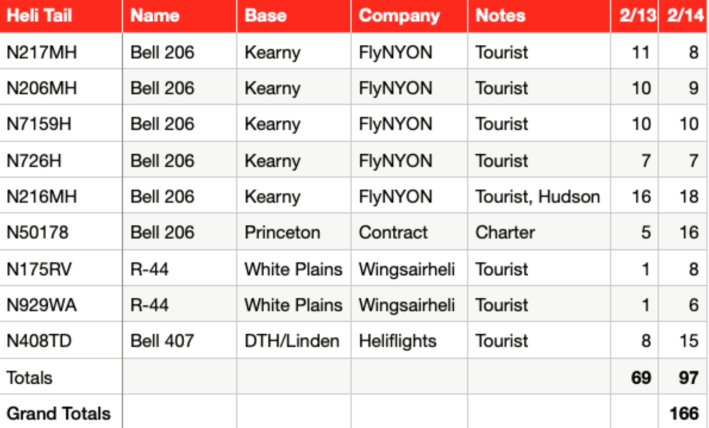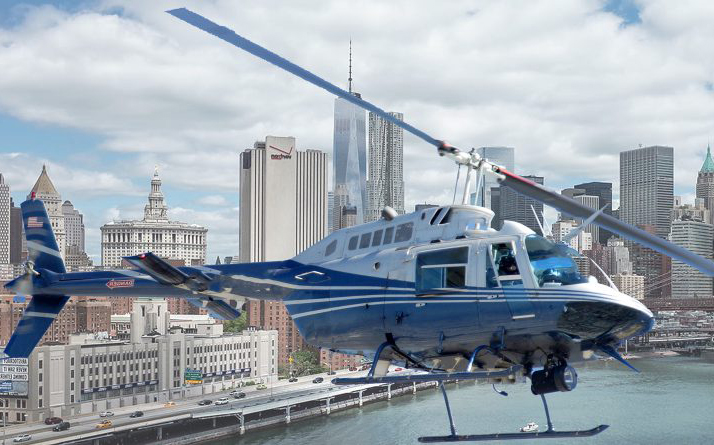A City Council effort to rein in private helicopters that locals say have terrorized the city with noise and pollution will do little to actually curb the problem, advocates say.
Last summer, amid a 130-percent increase in 311 complaints lodged against helicopters, Queens Council Member Paul Vallone and four colleagues proposed legislation to prohibit chartered helicopters from taking off and landing at heliports owned by the city if those helicopters do not meet so-called “stage 3” (quieter) federal noise levels.
But helicopter opponents say merely restricting use of the two city-owned ports — in Lower Manhattan and E. 34th Street (the W. 30th Street heliport is owned by the state and overseen by the Hudson River Park Trust) — won’t solve the problem since many tourist choppers, which would be exempt, according to the bill, fly in from just across the border in New Jersey or Westchester. Activists believe the city should impose even stricter regulations that all but prohibit private choppers from flying in and out of the city, both to mitigate noise, but also to reduce lead emissions from the fuel that some helicopters use, the latter of which the bill doesn’t even address.
“Intro 2026 is inadequate, if not downright myopic,” said Charles Komanoff in written testimony during a virtual hearing on the legislation on Wednesday. “Endeavoring to regulate noise levels for a single category of helicopter flights is a task both Sisyphean (given the inexhaustible legal and engineering resources of helicopter companies vis-a-vis chronically understaffed city agencies) and meager, given that chartered helicopters are just one of several classes of flights that we should be capping, shrinking and eliminating.”
The city’s Economic Development Corporation, which manages the city's ports, said that in 2020, there were around 6,000 flights that took off from the three heliports, compared to about 35,000 in 2019 — a drop of about 90 percent, mostly due to the drop in tourism during the pandemic. Yet complaints skyrocketed.
According to another helicopter opponent, much of the problem comes from choppers that don’t take off or land at the city-owned ports, but merely fly over the boroughs after coming from outside the city. Just last weekend, 166 helicopters flew over Manhattan from New Jersey, said Chelsea resident Melodie Brant during her testimony.

“Helicopters are a real problem for New Yorkers — and not just the helicopters that use City heliports. At this rate, summer is shaping up to be a real nightmare here. But I don't understand why we're still tiptoeing around the real solution,” said Bryant, urging the city to terminate its leases at its ports with private operators. “Time is passing and New Yorkers are suffering. Please. I'm begging the New York City Council to do better. If we have no power to stop the ensuing flood of tourist helicopters from NJ, at least we can reduce the pain at home.”
My Testimony: Helicopters are a real problem for New Yorkers - and not just the helicopters that use City heliports. This last weekend, which was cold and blustery, 166 sorties flew over Manhattan from New Jersey. At this rate, summer is shaping up to be a real nightmare here.
— @bikeloveny@post. (@bikeloveny) February 17, 2021
But it’s not just private helicopters that are the issue — an analysis of 311 data shows that the biggest jump in helicopter noise complaints occurred at the same time as the summer protests after the police killing of George Floyd in Minneapolis. The first massive protest in New York City was on May 29 after starting the day before, and a look at the data before and after that date makes clear that the chief culprit was the NYPD.
From March 15, 2019 through May, 28, 2019, there were 437 complaints lodged against helicopters; and during the same time period in 2020, there were 702 — a 60-percent increase that can partly be attributed to people staying home and being more aware of the noise, the EDC testified.
But on the day New Yorkers took to the streets in droves in support of the Black Lives Matter movement things drastically shifted, according to city data, with complaints against helicopters jumping 214 percent compared to the same May 29--Sept. 8 period a year earlier (2,343 complaints vs. 744). It's likely that much of the increase in complaints for helicopters, at least during the pandemic, were from the NYPD patrolling protestors from above.
And narrowing in on those dates even further, between May, 29, 2019 and June 1, 2019, there were just 10 complaints; but during the same time period in 2020, there were 119 — a whopping 1090-percent spike, according to city data.
Of the 119 complaints, 83 of them made through 311 listed “other” as the descriptor, 27 as NYPD, and nine as "news gathering." But it's unclear what "other" referred to as private charter and tourism flights were down 90 percent at this time, and sightseeing trips taking off from the Lower Manhattan heliport were entirely banned from mid-March through July, according to The City.
At the height of the protests, reporters and activists routinely took to Twitter to question the need for cops to do circles around peaceful protesters — often flying much lower than private choppers.
nypd has three helicopters hovering over manhattan just counting below 14th st. one of them has been hovering for 45min maybe 50 stories high, which they only do when they want to intimidate people since they're useless for surveying areas when they're that low. $6B annual budget
— New York Year Zero (@newyorkyearzero) June 3, 2020
NYPD helicopters are flying so low over Bed-Stuy tonight, they set off the sound alert on our baby monitor.
— Chris Choi (@thischoi) June 4, 2020
NYPD helicopter dips down low above the crowds. pic.twitter.com/ie4gYqMEv4
— Vincent Barone (@vinbarone) May 30, 2020
And it still hasn’t stopped.
I hear NYPD helicopters hovering over #parkslope. They can’t even lay off for #MLKDay?
— Joanna Oltman Smith (@jooltman) January 18, 2021
DCAS honchos said the NYPD manages its own fleet of seven choppers, and utilizes a field at Floyd Bennett Field for take off and landing, not the city’s ports.
“There’s seven helicopters in the police department, and of course, that’s a police emergency operation that is managed by the police department, DCAS is not involved in the day-to-day security and policing services related to that,” said Keith Kerman, Deputy Commissioner for DCAS, during the hearing. “Health and DEP go through DCAS contracts. The police department does the procurement directly.”
In addition to scrapping the council's bill and instead coming up with harsher restrictions on private helicopters, opponents are also urging the city to strictly regulate the NYPD's costly use of its helicopter fleet, which is a huge part of the problem.
"Sharply curtail NYPD helicopter deployments for other than exigent, life-saving situations," Komanoff wrote in his testimony.
For their part, EDC honchos testified against the bill, but for different reasons, saying it's impractical because it would "effectively ban (helicopters) from using the city's public use heliports" since the Federal Aviation Administration, which controls aviation efforts, have no plan to phase out the noisier helicopters, Stage 1 and 2, that currently in use now in favor of Stage 3.
Update: This article has been updated to clarify that the city owns two heliports, at E34th Street and Downtown Manhattan. The W. 30th heliport is overseen by the Hudson River Park Trust.






